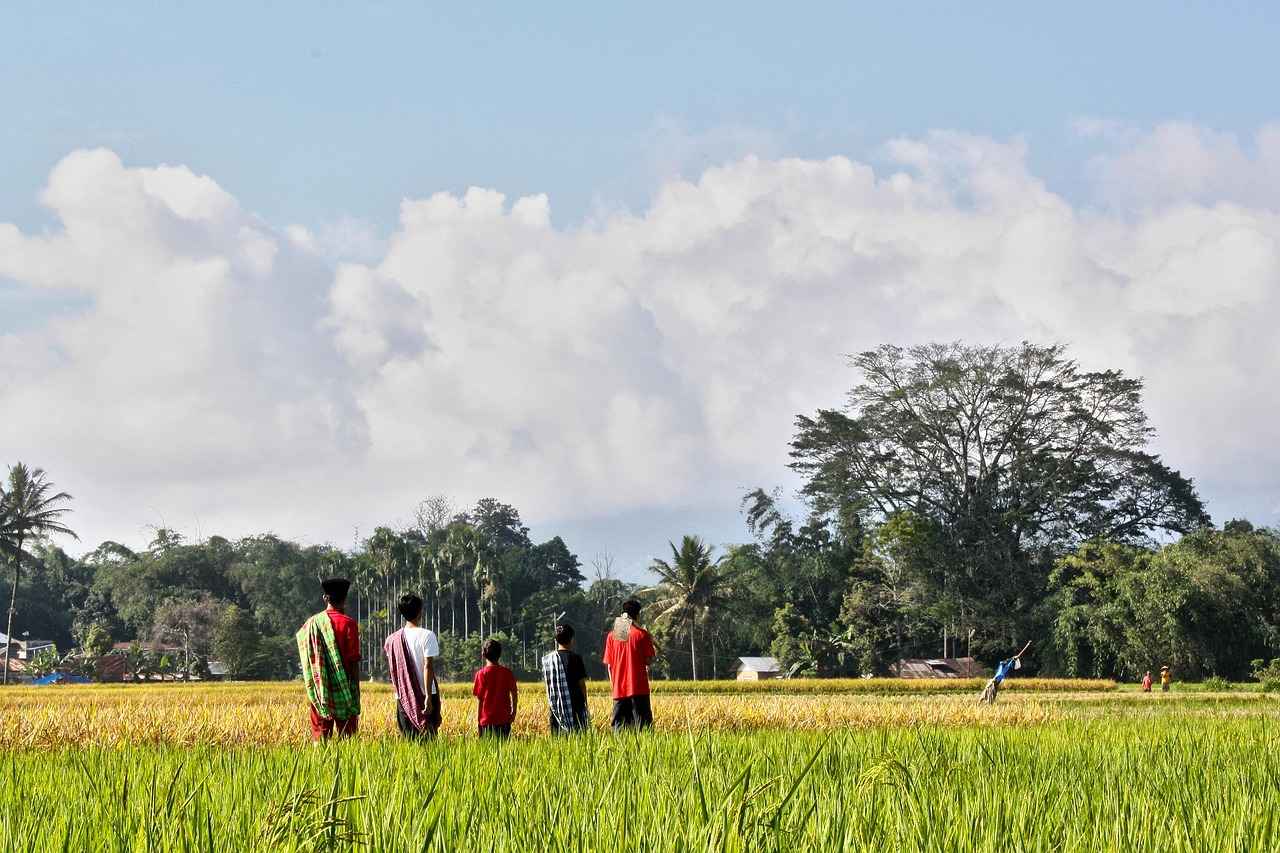This article delves into the various initiatives and programs implemented by the West Bengal government to aid local farmers, enhance agricultural productivity, and promote sustainable farming practices. The state has a long-standing agricultural tradition, and the government recognizes the importance of supporting farmers to ensure food security and economic stability.
Introduction to Agricultural Support in West Bengal
West Bengal is renowned for its diverse agricultural landscape, producing a variety of crops and supporting millions of livelihoods. The government plays a pivotal role in fostering agricultural development through a range of schemes designed to improve farmers’ living standards and agricultural practices.
Key Government Initiatives for Farmers
- Subsidy Programs for Agricultural Inputs
- Training and Skill Development Programs
- Financial Assistance and Credit Facilities
The government provides subsidies on essential inputs such as seeds, fertilizers, and pesticides. This initiative aims to make these inputs more affordable, ultimately enhancing crop yields and reducing production costs.
To promote modern agricultural techniques, the government conducts training sessions and workshops. These programs aim to equip farmers with sustainable farming practices that can lead to higher productivity and better resource management.
Various financial assistance programs, including crop loan schemes and insurance schemes, are available to farmers. These initiatives provide crucial support, enabling farmers to manage their finances effectively and invest in their agricultural activities.
Promotion of Sustainable Farming Practices
The West Bengal government emphasizes sustainable farming practices to ensure environmental conservation while improving agricultural productivity. Initiatives promoting organic farming and efficient water management are key components of this strategy.
Conclusion: The Future of Agriculture in West Bengal
The support provided by the West Bengal government is vital for nurturing a resilient farming community. By focusing on sustainable practices and providing necessary resources, the state aims to secure a prosperous agricultural future that benefits both farmers and consumers alike.

Introduction to Agricultural Support in West Bengal
West Bengal boasts a rich agricultural heritage, characterized by diverse crops and traditional farming practices. The state’s government recognizes the importance of agriculture to the economy and the livelihoods of its people. To this end, it has implemented a range of initiatives aimed at supporting farmers and enhancing agricultural productivity.
The West Bengal government plays a crucial role in ensuring that farmers have access to the necessary resources and support systems. This includes financial assistance, training programs, and subsidies that help farmers improve their agricultural practices and overall livelihoods.
One of the key aspects of the government’s support is the introduction of subsidy programs that make essential agricultural inputs more affordable. These subsidies cover a variety of resources, including seeds, fertilizers, and pesticides, which are vital for enhancing crop yields and reducing production costs.
In addition, the government conducts training and skill development programs aimed at educating farmers about modern agricultural practices. These programs not only enhance their skills but also promote sustainable farming techniques that are crucial for long-term agricultural success.
Furthermore, the West Bengal government recognizes the importance of financial stability for farmers. It offers crop loan schemes and insurance programs that provide financial security and peace of mind, allowing farmers to focus on their agricultural activities without the constant worry of unforeseen losses.
As the state moves forward, the emphasis on sustainable farming practices is becoming increasingly important. Initiatives that promote organic farming and improve water conservation are critical for ensuring that agriculture remains viable in the face of environmental challenges.
In conclusion, the West Bengal government’s multifaceted approach to supporting local farmers is essential for fostering a resilient agricultural community. By investing in their livelihoods and promoting sustainable practices, the government is paving the way for a prosperous agricultural future.

Key Government Initiatives for Farmers
The West Bengal government has implemented a variety of initiatives aimed at supporting farmers and enhancing agricultural productivity throughout the state. These initiatives are designed to address the challenges faced by farmers and to promote sustainable agricultural practices.
- Subsidies for Agricultural Inputs: The government provides subsidies on essential inputs such as seeds, fertilizers, and pesticides. This initiative helps farmers to access high-quality materials at reduced costs, ultimately leading to improved crop yields.
- Training Programs: Regular training sessions are organized to educate farmers about modern farming techniques and sustainable practices. These programs are crucial for enhancing the skill set of farmers and keeping them updated with the latest agricultural advancements.
- Financial Assistance: The government offers various financial assistance programs, including low-interest loans and grants, to help farmers invest in their agricultural activities. This financial support is vital for ensuring that farmers can manage their operations effectively.
- Crop Insurance Schemes: To protect farmers from unexpected losses due to natural disasters, the government promotes crop insurance schemes. This initiative provides a safety net for farmers, allowing them to recover from adverse events.
- Promotion of Organic Farming: The government encourages organic farming practices, which not only improve soil health but also cater to the growing demand for organic produce among consumers.
- Water Conservation Initiatives: Given the challenges posed by climate change, the government has launched programs focused on water conservation and management. These initiatives are essential for ensuring sustainable agriculture in water-scarce regions.
In conclusion, the West Bengal government’s comprehensive approach to supporting farmers through subsidies, training, and financial aid plays a crucial role in enhancing agricultural productivity and promoting sustainable practices. These initiatives not only empower farmers economically but also contribute to the overall development of the state’s agricultural sector.
Subsidy Programs for Agricultural Inputs
The agricultural sector is fundamental to the economy of West Bengal, and the government recognizes the need to support farmers through various subsidy programs. These initiatives are designed to make essential agricultural inputs, such as seeds, fertilizers, and pesticides, more affordable and accessible. By reducing the financial burden on farmers, these subsidies play a critical role in enhancing crop yields and lowering production costs.
One of the key components of these subsidy programs is the provision of high-quality seeds. The government ensures that farmers can access seeds that are not only affordable but also suitable for the region’s climate and soil conditions. This accessibility leads to better crop performance and contributes to food security.
Additionally, the government offers substantial subsidies on fertilizers and pesticides. These inputs are essential for maximizing agricultural output, yet they can be costly. By subsidizing these products, the government allows farmers to invest more in their land and resources, ultimately leading to increased productivity. This financial relief helps farmers focus on improving their farming methods and yields without the constant pressure of high input costs.
Moreover, the subsidy programs are complemented by initiatives that promote sustainable farming practices. By encouraging the use of organic fertilizers and integrated pest management, the government aims to reduce the environmental impact of agriculture while ensuring that farmers remain profitable.
In conclusion, the subsidy programs for agricultural inputs in West Bengal are vital for empowering farmers. By making essential resources more accessible and affordable, these initiatives not only enhance crop yields but also help to stabilize the agricultural economy. The ongoing support from the government fosters a resilient farming community capable of adapting to challenges and thriving sustainably.
Seed Subsidy Schemes
The West Bengal government has implemented as a vital component of its agricultural support initiatives. These programs are designed to ensure that local farmers have access to high-quality seeds, which are essential for achieving improved crop performance and enhancing food security across the region.
By providing subsidies, the government aims to reduce the financial burden on farmers, enabling them to invest in superior seed varieties that promise better yields. The importance of using quality seeds cannot be overstated, as they are the foundation of successful farming practices. Quality seeds are known to be more resistant to pests and diseases, which translates into healthier crops and a more sustainable farming ecosystem.
Moreover, these schemes are particularly beneficial for smallholder farmers who may struggle to afford the best seed options. The subsidies help level the playing field, allowing all farmers, regardless of their financial situation, to access the resources they need to thrive. This initiative not only boosts individual farm productivity but also contributes to the overall agricultural output of West Bengal.
In addition to financial support, the government also provides educational resources to inform farmers about the benefits of using improved seed varieties. Workshops and training sessions are organized to equip farmers with the knowledge necessary to select and cultivate these seeds effectively. This comprehensive approach ensures that farmers are not only receiving financial assistance but are also empowered with the skills needed to maximize their crop potential.
In conclusion, the seed subsidy schemes launched by the West Bengal government are a crucial element in promoting sustainable agriculture. By ensuring access to high-quality seeds, the government is helping to secure a stable food supply and enhance the livelihoods of local farmers, ultimately contributing to the resilience of the agricultural sector in the region.
Fertilizer and Pesticide Subsidies
play a critical role in supporting farmers, particularly in agricultural regions like West Bengal. By providing these subsidies, the government significantly reduces the financial burden on farmers, enabling them to allocate their resources more efficiently.
The primary aim of these subsidies is to make essential agricultural inputs, such as fertilizers and pesticides, more affordable. This is particularly important for smallholder farmers who often operate with tight budgets. When farmers can access these inputs at a reduced cost, they are more likely to invest in higher-quality products that can enhance their crop yields.
Moreover, the financial relief provided by these subsidies allows farmers to focus on other critical areas of their farming operations. For instance, they can invest in better irrigation systems, purchase improved seeds, or even explore innovative farming techniques. This holistic approach not only boosts productivity but also contributes to the overall sustainability of their farming practices.
In addition to direct financial benefits, the government’s subsidy programs are also designed to encourage the use of environmentally friendly practices. By promoting the use of organic fertilizers and integrated pest management techniques through these subsidies, farmers can reduce their reliance on harmful chemicals, leading to healthier crops and a safer environment.
| Subsidy Type | Description | Benefits |
|---|---|---|
| Fertilizer Subsidy | Financial support for purchasing fertilizers. | Lower production costs, increased crop yields. |
| Pesticide Subsidy | Assistance for acquiring pest control products. | Enhanced crop protection, reduced pest-related losses. |
Overall, the implementation of fertilizer and pesticide subsidies is a strategic move by the government to enhance agricultural productivity and improve the livelihoods of farmers. As these initiatives continue to evolve, they promise to foster a more resilient agricultural sector capable of meeting the challenges of the future.
Training and Skill Development Programs
play a pivotal role in the advancement of agricultural practices in West Bengal. The government recognizes the importance of equipping farmers with the necessary skills and knowledge to thrive in a rapidly changing agricultural landscape. Through a series of well-structured training sessions and workshops, the government aims to enhance farmers’ expertise in sustainable farming techniques.
These programs cover a wide range of topics, including:
- Modern Crop Management: Farmers learn about the latest practices in crop rotation, pest management, and soil health to optimize yield.
- Organic Farming Techniques: Training sessions focus on organic methods that reduce dependency on chemical fertilizers and pesticides, promoting healthier ecosystems.
- Water Conservation: Workshops educate farmers on efficient irrigation practices and rainwater harvesting, crucial for sustainability in agriculture.
- Use of Technology: The integration of technology in farming is emphasized, with training on using apps and tools for better farm management.
In addition to these key areas, the government also facilitates hands-on training where farmers can practice new techniques in real-world settings. This practical approach ensures that the knowledge gained is effectively applied to their farming operations.
Furthermore, partnerships with agricultural universities and research institutions enhance the quality of these training programs. Expert trainers and agronomists lead these sessions, providing valuable insights and answering farmers’ queries.
As a result of these initiatives, many farmers have reported increased productivity and profitability. The government’s commitment to sustainable agriculture not only supports farmers but also contributes to the overall food security of the region.
In conclusion, the training and skill development programs initiated by the West Bengal government are vital for empowering farmers. By fostering a culture of continuous learning, the government is paving the way for a more resilient agricultural sector that can adapt to future challenges.

Financial Assistance and Credit Facilities
The West Bengal government has implemented a variety of financial assistance programs and credit facilities aimed at supporting local farmers in their agricultural endeavors. These initiatives are designed to empower farmers, ensuring they have the necessary resources to manage their finances effectively and invest in agricultural development.
One of the key components of these support systems is the crop loan schemes. These schemes provide farmers with access to low-interest loans, which are essential for financing agricultural activities such as purchasing seeds, fertilizers, and equipment. By offering these loans, the government enables farmers to cultivate their land without the burden of high-interest rates, ensuring timely planting and harvesting.
Additionally, the government promotes various insurance schemes that protect farmers from unforeseen events such as natural disasters or crop failures. These insurance programs offer a safety net, allowing farmers to recover financially and continue their agricultural practices without severe setbacks.
| Type of Assistance | Description |
|---|---|
| Crop Loan Schemes | Low-interest loans for financing agricultural activities. |
| Insurance Schemes | Protection against losses due to natural disasters. |
| Subsidies | Financial support for seeds, fertilizers, and equipment. |
Furthermore, the West Bengal government has introduced subsidy programs that significantly reduce the cost of essential agricultural inputs. By subsidizing seeds, fertilizers, and pesticides, farmers can access high-quality materials at lower prices, which in turn enhances their productivity and profitability.
In conclusion, the financial assistance and credit facilities provided by the West Bengal government are crucial for the sustainability of local agriculture. By ensuring that farmers have access to necessary funds and resources, the government fosters a thriving agricultural sector that can withstand challenges and continue to grow.
Crop Loan Schemes
play a vital role in supporting farmers, particularly in regions where agriculture is the backbone of the economy. These schemes are designed to provide affordable financial assistance to farmers, enabling them to cover the costs associated with cultivation, maintenance, and harvesting of their crops.
In many agricultural communities, timely access to funds is crucial. Crop loan schemes typically offer low-interest rates, making it easier for farmers to secure the necessary financing without incurring overwhelming debt. This financial support allows farmers to invest in essential resources such as seeds, fertilizers, and equipment, which are critical for achieving optimal crop yields.
Moreover, these loans are often structured to align with the agricultural cycle. This means that farmers can borrow funds at the beginning of the planting season and repay them after the harvest, ensuring that they do not face financial strain during the critical growing period. Such flexibility is essential for maintaining a stable cash flow and ensuring that farmers can focus on their agricultural practices without the constant worry of financial burdens.
Additionally, crop loan schemes may also come with additional benefits such as insurance coverage against crop failures due to adverse weather conditions or pests. This added layer of security encourages farmers to take calculated risks, such as trying new crops or adopting innovative farming techniques that could lead to higher productivity.
In conclusion, crop loan schemes are a fundamental component of agricultural support systems. By providing farmers with the necessary financial resources, these schemes not only enhance productivity but also contribute to the overall economic stability of rural communities. As agriculture continues to evolve, the importance of accessible financial support cannot be overstated.
Insurance Schemes for Farmers
The West Bengal government recognizes the importance of safeguarding farmers from the unpredictable nature of agricultural practices, particularly in the face of natural disasters such as floods, droughts, and cyclones. To this end, the government has established comprehensive crop insurance schemes that serve as a critical safety net for farmers, ensuring their financial stability and peace of mind.
These insurance schemes are designed to protect farmers from unforeseen losses, enabling them to recover from damages caused by adverse weather conditions and other calamities. By providing financial compensation for lost crops, the schemes not only help farmers bounce back but also encourage them to continue investing in their agricultural activities without the fear of devastating losses.
Moreover, the government has made it easier for farmers to access these insurance products through a simplified application process. This accessibility ensures that even smallholder farmers can benefit from the protection offered by these schemes. The government often collaborates with various insurance companies to offer tailored policies that suit the specific needs of farmers in different regions of West Bengal.
In addition to providing immediate financial relief, these insurance schemes promote long-term agricultural sustainability. By reducing the financial risks associated with farming, they allow farmers to focus on improving their practices, investing in better seeds, and adopting advanced farming techniques. This ultimately leads to enhanced productivity and contributes to the overall growth of the agricultural sector in the state.
Furthermore, the government actively conducts awareness programs to educate farmers about the importance of crop insurance and how to effectively utilize these schemes. This proactive approach not only empowers farmers but also fosters a culture of risk management within the agricultural community.
In conclusion, the crop insurance schemes implemented by the West Bengal government play a pivotal role in securing the livelihoods of farmers. By offering essential protection against unforeseen losses, these initiatives not only provide financial security but also encourage sustainable agricultural practices, paving the way for a more resilient farming community.

Promotion of Sustainable Farming Practices
is a crucial aspect of modern agriculture, especially in regions like West Bengal, where environmental conservation and farmer livelihoods are intertwined. The West Bengal government recognizes the significance of adopting sustainable methods that not only enhance agricultural productivity but also protect the environment for future generations.
Through a variety of initiatives, the government aims to educate farmers about sustainable farming techniques that minimize environmental impact while maximizing yield. These practices include:
- Organic Farming: The promotion of organic farming is at the forefront of the government’s agenda. By encouraging farmers to utilize organic fertilizers and pest control methods, the government helps reduce chemical runoff into water bodies, thereby preserving biodiversity.
- Integrated Pest Management (IPM): This strategy involves using biological control methods and crop rotation to manage pests effectively without heavy reliance on chemical pesticides. Training programs are conducted to educate farmers on implementing IPM.
- Soil Health Improvement: Initiatives aimed at improving soil health through crop rotation, cover cropping, and reduced tillage are essential. Healthy soil enhances water retention and fertility, leading to better crop yields.
- Water Conservation Techniques: The government promotes practices such as rainwater harvesting and drip irrigation. These methods not only conserve water but also ensure that crops receive adequate moisture, even during dry spells.
Moreover, community engagement is vital for the success of these sustainable practices. The government organizes workshops and community meetings to share knowledge and success stories, fostering a sense of collaboration among farmers.
In conclusion, the West Bengal government’s emphasis on sustainable farming practices is a significant step towards achieving a balance between agricultural productivity and environmental conservation. By investing in education and resources for farmers, the government is paving the way for a more sustainable agricultural future.
Organic Farming Initiatives
The West Bengal government has recognized the significance of organic farming as a sustainable agricultural practice that not only enhances the income of farmers but also contributes to the health of consumers. This initiative is pivotal in transforming the agricultural landscape of the state.
Through a range of programs, the government actively promotes organic farming as a viable alternative to conventional farming methods. These programs are designed to provide farmers with the necessary resources, knowledge, and support to transition to organic practices. The benefits of organic farming extend beyond financial gains for farmers; they also include improved soil health, reduced chemical runoff, and healthier food options for the community.
Key Components of the Organic Farming Initiatives:
- Training Workshops: The government organizes regular training sessions to educate farmers about organic farming techniques, pest management, and soil health.
- Financial Incentives: Subsidies and grants are available to cover the costs associated with transitioning to organic farming, including certification expenses.
- Market Access: The government facilitates access to markets for organic produce, ensuring that farmers can sell their products at competitive prices.
- Research and Development: Investment in research helps develop better organic farming practices and crop varieties suited for the local climate.
Moreover, the government collaborates with various agricultural universities and institutions to promote research in organic agriculture. This collaboration aims to develop innovative solutions that can help farmers overcome challenges associated with organic farming.
In conclusion, the led by the West Bengal government not only empower farmers economically but also promote a healthier lifestyle for consumers. As these programs continue to evolve, they are likely to play a crucial role in shaping the future of agriculture in the state.
Water Conservation and Management
are essential components of sustainable agriculture, particularly in regions grappling with the dual challenges of climate change and water scarcity. As agricultural demands increase, the need for effective water management practices becomes even more critical.
Farmers are increasingly facing unpredictable weather patterns, which can lead to droughts or excessive rainfall. To combat these issues, innovative irrigation techniques such as drip and sprinkler systems are being promoted. These methods not only optimize water usage but also enhance crop yields. Additionally, rainwater harvesting systems are being implemented to capture and store rainwater, providing a supplementary water source during dry spells.
| Water Management Practices | Benefits |
|---|---|
| Drip Irrigation | Reduces water wastage and improves crop health |
| Rainwater Harvesting | Provides an alternative water source during droughts |
| Soil Moisture Monitoring | Ensures optimal irrigation scheduling |
Furthermore, educating farmers about soil health and its relationship with water retention can lead to better crop resilience. Practices like cover cropping and reduced tillage can improve soil structure, enhancing its capacity to retain moisture.
Collaboration between government agencies, NGOs, and local communities is vital to promote awareness and training regarding these practices. By fostering a culture of water stewardship, farmers can contribute to a more sustainable agricultural landscape that not only supports their livelihoods but also protects vital water resources for future generations.
In conclusion, addressing water conservation and management is not merely a choice but a necessity for sustainable agriculture. Through innovative practices and community engagement, it is possible to build a resilient agricultural framework capable of withstanding the pressures of climate change and ensuring food security.

Conclusion: The Future of Agriculture in West Bengal
The West Bengal government’s unwavering support for local farmers is not just a temporary measure; it is a strategic investment in the state’s agricultural future. By implementing a range of initiatives and programs, the government is fostering a resilient farming community capable of thriving both economically and sustainably.
With a rich agricultural heritage, West Bengal is home to a diverse range of crops, and the government’s proactive measures ensure that farmers have the necessary resources and knowledge to maximize their yields. This includes providing subsidies for essential agricultural inputs such as seeds, fertilizers, and pesticides, which significantly lowers the financial burden on farmers. These subsidies not only make farming more affordable but also encourage the adoption of modern agricultural practices that can lead to increased productivity.
Moreover, the government’s emphasis on training and skill development is vital. By equipping farmers with the latest techniques and sustainable practices, the state is ensuring that they can adapt to changing environmental conditions and market demands. This focus on education empowers farmers, making them more resilient in the face of challenges.
Financial assistance programs, including crop loan schemes and insurance options, provide farmers with the necessary security to invest in their operations without the fear of unforeseen losses. These measures are critical in building a safety net for farmers, allowing them to focus on enhancing their productivity and income.
Lastly, the promotion of sustainable farming practices is essential for the long-term health of the agricultural sector. By encouraging organic farming and effective water management, the government is not only protecting the environment but also ensuring that future generations of farmers can continue to thrive.
In summary, the West Bengal government’s comprehensive support for local farmers is pivotal in shaping a prosperous agricultural landscape. By fostering resilience, sustainability, and economic viability, the state is laying down the groundwork for a bright agricultural future that benefits all stakeholders involved.
Frequently Asked Questions
- What types of subsidies are available for farmers in West Bengal?
The West Bengal government offers various subsidies, including seed, fertilizer, and pesticide subsidies. These programs are designed to make essential agricultural inputs more affordable, helping farmers enhance their crop yields and reduce production costs.
- How does the government support skill development for farmers?
The government conducts training sessions and workshops aimed at improving farmers’ skills in sustainable farming practices. These initiatives empower farmers with the knowledge needed to adopt modern agricultural techniques and improve productivity.
- Are there any financial assistance programs available for farmers?
Yes, the West Bengal government provides various financial assistance programs, including crop loan schemes that offer low-interest loans. This helps farmers manage their finances effectively and invest in agricultural development.
- What measures are in place to protect farmers from natural disasters?
The government promotes crop insurance schemes that safeguard farmers against unforeseen losses due to natural disasters. This provides them with financial security and peace of mind, allowing them to focus on their agricultural activities.
- How is sustainable farming promoted in West Bengal?
The West Bengal government emphasizes sustainable farming practices through initiatives like organic farming programs and water conservation efforts. These programs not only benefit the environment but also improve the livelihoods of farmers.



























































